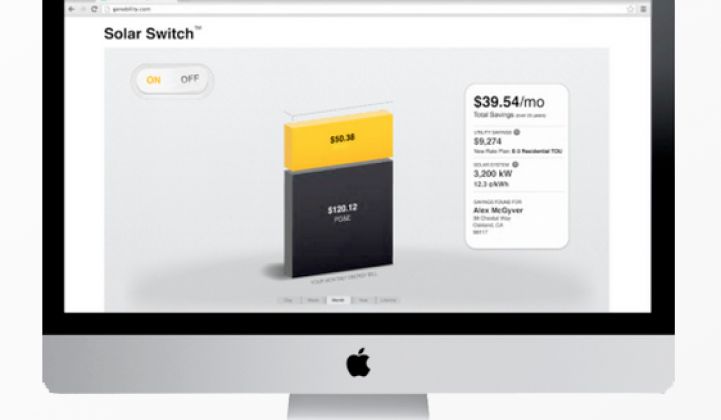Genability is best known for its work in the solar business. But the San Francisco-based startup has also completed a Series A funding round and gained a strategic partner for its commercial and industrial energy efficiency offering.
EnerNOC is the sole fundraiser for the Series A and has entered into a licensing agreement to gain exclusive rights to some of Genability’s software. “This will help [EnerNOC] bring the same cost savings it provides through demand response to its clients for all the other fifteen-minute intervals of the year,” said Jason Riley, CEO of Genability.
The deal will provide a strong partner for Genability to develop its energy efficiency offering while still leaving it room to develop independently in the solar and connected home markets.
In the solar market, Genability’s software product, called Switch, is used to more accurately assess how much a customer might save if she installs solar. It provides the data in terms of dollars rather than kilowatt-hours. It also integrates data from the solar provider about the system itself, along with electricity tariffs and available energy usage data. In 2012, Genability received $500,000 from the DOE for its software to help reduce the soft costs of distributed solar installation.
Currently, solar accounts for nearly two-thirds of Genability’s business. The other third is split between connected home companies like Alarm.com and commercial customers. It is the latter suite of products that will no longer be offered in the open market. Genability is leading with solar because it is the fastest-growing market, but Riley seemed equally excited about many different areas of the new energy economy.
The undisclosed amount of new funds will be used to expand Genability’s team of software engineers and data scientists. Beyond solar, the startup sees promise in the burgeoning EV market and also in connected home products. “Our business plan doesn’t necessarily need a lot more capital, which is why were more interested in a strategic rather than a venture capital investor,” said Riley.
Genability is also soon launching a new product, Verified by Genability, which will serve as an independent assessment of electricity cost savings for far more than energy efficiency projects. The first application will be for the solar business, where customers can get third-party verification of savings. Eventually it will be available for all the markets Genability serves.
The partnership with EnerNOC will allow Genability to reach a wider set of commercial clients than it could on its own, while it gives EnerNOC more analytics as part of its software products. “They have some really interesting stuff they want to do with real-time demand management, above and beyond what they do right now with demand response,” said Riley.
Genability’s tariff engine will be integrated into EnerNOC’s energy applications, so that commercial and industrial clients can get more accurate energy forecasts and do measurement and verification on planned or completed energy retrofits.
“Connecting energy efficiency measures to dollars is what drives organizational change and justifies future investments in energy efficiency projects, but with thousands of different utility tariffs in the U.S. alone, giving customer-specific projections can be a challenge, particularly for enterprise customers that could have dozens or even hundreds of sites,” Micah Remley, VP of product strategy and technology at EnerNOC, said in a statement.
EnerNOC has increasingly been focused on building out its offering beyond traditional demand response, as are most of its competitors. Until now, however, the company has acquired other businesses to integrate their technologies, rather than making investments. EnerNOC has made more than ten acquisitions to build its business abroad or expand its offerings in the U.S.
Tim Healy, CEO of EnerNOC, will also join Genability’s board of directors.



